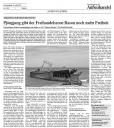San Diego neurosurgeon Dr. Kevin Yoo recently spent the first half-day of his medical mission to North Korea assembling a $20,000 surgical operative microscope that his travel partner donated to the Pyongyang University Hospital.
And both he and his fellow neurosurgeon Dr. Kee Park, who retired from private practice in Missouri several years ago to devote himself to humanitarian medical projects, demonstrated the effectiveness of the new scope in a series of operations they performed or assisted in during their three-day teaching visit to the North Korean capital in early June.
Yoo, 45, a Carmel Valley resident and father of three children, who was born in Seoul, South Korea, took time off from his busy practices in La Jolla, Poway and Temecula to join Park in a “special access” mission to the isolated communist state arranged with the help of the United Nations.
Park previously made similar trips to Ethiopia, Nepal and, on four occasions, to North Korea.
Yoo learned of Park’s humanitarian efforts at a meeting of Korean-American Spine Surgeons and volunteered to join Park, who lives in Indiana, on his fifth visit to North Korea last month.
“He didn’t think I would show up, but I did,” Yoo said.
They rendezvoused at the Inchon International Airport in South Korea and traveled together to North Korea via Beijing.
Yoo is a staff physician at Scripps Memorial Hospital in La Jolla specializing in head, neck and spine surgery.
Commenting on his visit to North Korea, Yoo said he was impressed with the knowledge, intelligence and skill of the North Korean surgeons. “But,” he said, “they just didn’t have the tools” that American surgeons often take for granted.
“The microscope was a tremendous addition to what they had,” Yoo said. “Dr. Park told me they had an old microscope that was broken down and he had a terrible headache using it because only one of the eyepieces worked and the visualization was pretty poor.”
Initially, Yoo was scheduled to assist in the operations, but, as it turned out, he did most of the work on two lumbar disc operations that the North Koreans were not used to performing “the way I did it.”
Given the tense political climate between Pyongyang and Washington these days, especially after the alleged North Korean torpedo attack and sinking of a South Korean warship in March, we asked if he and Park, as Americans, had experienced any animosity toward them.
“No,” Yoo said, “we were very well received. The gratitude they showed was always present, and I was told many times to come back.
“They were very grateful, and, obviously, very much in need of our help, very much in need of tools. It can be as simple as sterile gloves. They have them, but they have to recycle them. These guys would take the gloves, wash them, re-powder them, and use them again. And, for us, everything is disposable.
“I would just like to be able to share with them what we have,” he said.
He is hoping he may be able to convince Scripps to allow him to collect unused items from the operating room to donate to the hospital in Pyongyang on a return visit to North Korea being planned for next October.
“The need is great,” he said.
Yoo said he is not a political person. He is, however, interested in helping in “people-to-people” missions “that have a medical bent to them.”
Asked what gives him the greatest satisfaction in his work, he said: “Medicine is really tough these days. There are a lot of disappointments. Just to get paid for our services, we have to fight so much. So satisfaction is sometimes very difficult to obtain.
“But the thing that keeps us going on is good results and good patient outcome. But it’s so overshadowed by all the other things we have to deal with, regulations, not being paid … and fighting with the insurance companies.”
But, he said, he is beginning to enjoy the business aspects of his work.
“I don’t like fighting with insurance companies, but I do like the art of the business side of it, just practicing, surviving and making it work.
“The bottom line is, it really is a business. I put my practice on hold and spent several thousand dollars going to North Korea. I couldn’t do that if I wasn’t running a profitable practice.”

